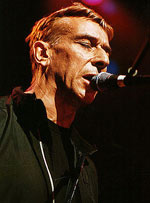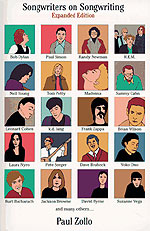Hallelujah! | |

| It's Friday night post-gig at Exeter Arts Centre: there's five of us, later four, sitting around a table in the bar having just seen John Cale, who was utterly brilliant: on that we're all agreed. I feel like I've just seen one of the rock legends. Velvet Underground, Andy Warhol, Eno, Nico - this man has been there, done that; he's no slouch solo either. Whether it's a ballad like 'Ship of Fools', the rockier 'Cable Hogue' [in an assumed voice], or a startling deconstruction of 'Heartbreak Hotel' [which I've never liked before tonight], Cale is spellbinding, utterly brilliant - on that we're all agreed, along with the rest of the sell-out audience. There's only one unhappy punter: a friend out for a drink with a girfriend, who suddenly realises he's missed a gig he wanted to see; worse, missed Cale singing Leonard Cohen's 'Hallelujah' - live, not 20 yards from where he's been guzzling his lager unaware. I've reiterated the 'agreed' because pretty soon the discussion veers off into the usual snide comments about other bands we like or dislike. Led Zeppelin? Pah! Steely Dan? Crap! The Magnetic Fields? Get a life! etc. I don't know Nick very well [who confesses to having a ticket for the Led Zep covers band playing next month], but I know Alistair is on a Dylan binge at the moment, the records and CDs piled high in his attic hideaway, and Sue has been playing Eva Cassidy CDs - the result of an impulsive buy after hearing a track on Radio 2 on the way to work. Meanwhile, apart from the ever-present jazz, the recent Tom Ovans CD and Emmylou Harris' A Cowgirl's Prayer are top of my current playlist. |
What seems to connect it all is - no astounding revelations here! - songs. Wherever our musical wanderings take us, through out/post-rock, jazz, hiphop, techno, rap or improvisation, everyone I know sooner or later [and, yes, age definitely does have something to do with this] comes back to songs. Not even, necessarily, singers - but songs. Little snapshots, portraits, fragmented lives, big epic narratives... Stories. Songs. Cale has been entertaining us for 70 minutes with songs. Often songs rescued from the less successful parts of his back catalogue - several I really liked tonight turned out to be from his last Rykodisc CD, Walking on Locusts, which is a horrible overproduced, over-orchestrated affair I've hardly played. One of my favourite songs tonight, 'Dying on the Vine', is the only good thing on Artificial Intelligence. It's been a long time since the classic 70s albums Fear and Slow Dazzle, the shockingly brutal masterpiece Music for a New Society, or the partially successful - but moving and heartfelt - Warhol tribute album Songs for Drella. But from every part of Cale's output - even the proto-punk/thrash violence of his New York period, documented on the ROIR tape Even Cowgirls Get the Blues and the Comes Alive album - he plucks songs out to play. Alone with guitar or piano they reveal their heart, their centre - in many ways simple, classic, songs. Singer-songwriter songs. Okay, they're sometimes dressed up with some pseudo-experimental contemporary classical piano, just to remind us of Cale's avant-garde roots [La Monte Young, Jon Hassell, blah blah blah]; he continues to play 'Heartbreak Hotel' so we know he knows all about rock'n'roll - however ironically; and sometimes he play-acts emotional extremes, partly to help the set move along ['dynamics' if you want to be technical], partly because, hey, these are heartfelt songs from a grand master of rock. I mean, leather trousers, Velvet Underground, axes and pianos; dead chickens. This man is uttrly brilliant: we are all agreed. But it's not so easy, truth to tell, to slip Cale into the 'singer-songwriter' bracket. I've almost finished reading Songwriters on Songwriting, a 600 page anthology of interviews from SongTalk magazine, conducted by Paul Zollo [Da Capo press]. It's fascinating reading, but I can't help feeling there's a hidden - well, not so hidden, actually - agenda at work. Even with the inclusion of some token interviewees who don't really belong here - Zappa? Dave Brubeck? - there's a clear sense of W.A.S.P.-ishness at work here. A 'tradition' from Pete Seeger [who starts the book] via Bob Dylan and Brian Wilson, Crosby and Young, through to Santana, Jackson Browne and Bruce Cockburn, to the token new boys/girls, Madonna and REM. Of course, there's diversions - to Bacharach & David, Yoko Ono and Van Dyke Parks - but this is pretty much territory where folk meets country meets rock meets the blues. There's not much hint of rap or punk at work here, no sense of experiment or chaos. These people are wordsmiths, who hand out their souls on plates to anyone who's listen. | |

| But, I guess, that's unfair, because it's a great book. Zollo manages to combine career overviews with song/lyric-specific questions, and also chases that elusive idea of how songs are written: inspiration or work? given or made? It's interesting that some of the guys who work hard and regularly, like Randy Newman, are the ones who produce so few albums. Others write songs when it happens, be it the middle of the night or in the studio as the album-deadline approaches. Cockburn often writes when travelling, compiling notes of what he sees which he assembles into travelogues; Leonard Cohen writes and rewrites and rewrites until the lyrics are good - he talks about one song for which he has 60 verses available! Apart from the information about specific songs by the artists I like - and this book reminded me just how much I do like Cockburn, Neil Young, Rickie Lee Jones, Leonard Cohen, Laura Nyro and Jackson Browne - it's this discussion of varying approaches to, and feeling for, songwriting that holds my attention. The mechanics of creation are partly laid bare - not, necesssarily in the songs [because, like poetry, songs aren't always autobiography, they're often fictions, stories and make-believe] - and it's intriguing stuff. Even if John Cale is neither present, nor - I suspect - missed by Mr. Zollo. Cale doesn't seem quite as 'solid', as settled and tame as most of the people here, whatever their murky excessive past! Cale still has an air of 'danger', of 'performance art', of New York glamour about him: he still appears to live on the edge. [But what do I know? He probably drinks camomile tea and east choccy biccies in his pyjamas. Perhaps they're leather pyjamas though... Anyway, on, on...] Meanwhile, a friend tells me there's a new secondhand record store open in town, and I wander down to check it out. Records are carefully racked up, the prices are cheap, the vinyl is clean and flat. Today, it's the singer-songwriters that catch my eye and who I wander home with: John Stewart's California Bloodlines, a couple of Mathilde Santing's albums I only had on tape, two albums of T-Bone Burnett and Steven Soles in the Alpha Band, and - just to keep myself on my toes - a good copy of The Pop Group's for how much longer do we tolerate mass murder? to replace my dilapidated copy. I place them by the stereo and settle down to peruse the credits and lyric sheets. But first, there's something I must do. I find Fragments of a Rainy Season, a live John Cale CD and put it on. Sunlight streams through the window, his rich voice and resonating piano fill the room. 'Never win and never lose...'. He's utterly brilliant. Are we all agreed? © Rupert Loydell 2001 |